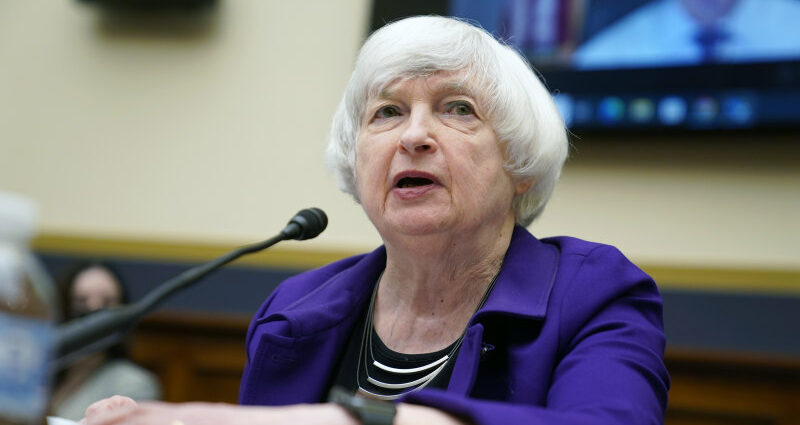Treasury Secretary Janet Yellen gave a glass-half-full assessment of the US economy, acknowledging a slowdown that she called necessary to tame inflation while rejecting the notion the country had entered a recession.
“We do see a significant slowdown in growth,” Yellen said at a press conference on Thursday. But a true recession is a “broad-based weakening of the economy,” she said. “That is not what we’re seeing right now.”
US Treasury Secretary Janet Yellen rejected that the US is in a recession.Credit:AP
Thursday’s data fired up the debate over whether the US had indeed slipped into a recession. While two straight quarters of economic contraction fit a global, broad definition of a “technical” recession, the White House has pushed back against that determination, citing job growth and consumer spending.
For the Average Joe, taking to Twitter to joke about all the different definitions of what an economic contraction means, it’s no laughing matter, given the prospect of a downturn that drives up unemployment.
It’s also deadly serious to politicians, with midterm elections around the corner.
“Joe Biden has officially plunged America into a recession,” Republican Senator Rick Scott of Florida, head of the GOP’s 2022 Senate campaigns, said in a statement.
US president Joe Biden invoked Jerome Powell’s assessment in his defence, saying that the Federal Reserve chair and “many of the significant banking personnel and economists say we’re not in a recession.”
Back-to-back quarters of declines in GDP define a recession in most parts of the world, but in the US it’s not official until economists at the National Bureau of Economic Research deem it so.
The NBER’s business cycle dating committee rejects the notion that two quarterly contractions in gross domestic product is conclusive of a recession. Instead, the group of eight elite academic economists looks at half a dozen monthly economic reports to see a “a significant decline in economic activity that is spread across the economy and that lasts more than a few months.”
Yellen remained optimistic when pressed on whether the Federal Reserve’s fight against inflation is bound to cause a serious uptick in the jobless rate, which still sits at 3.6 per cent.
“I believe, there is a path to bring down inflation while maintaining a strong labour market,” she said. “That’s not a certainty that can be done, but I believe there is a path to accomplishing that.”
Employment climbed by 1.1 million jobs in the second quarter, a sharp contrast with the average loss of 240,000 in the first three months of past recessions, Yellen said.Credit:AP
The Treasury chief repeatedly stressed the positive, pointing to continued job creation, strong household finances, gains in consumer spending and growth in business. Employment climbed by 1.1 million jobs in the second quarter, a sharp contrast with the average loss of 240,000 in the first three months of past recessions, she said.
“We need to see a slowdown,” Yellen said. “The labour market is extremely tight, and may be the source of some inflationary pressure,” she said, while emphasising the important contributions of food and energy costs, driven by war in Ukraine, and supply-chain bottlenecks to overall inflation across the globe.
Bringing inflation down is a top priority for the administration, Yellen reiterated. Consumer-price gains are “likely to come down in the days ahead,” she added.
She also endorsed once again steps taken by the central bank. The Fed has dramatically shifted monetary policy this year, raising its benchmark interest rate by 2.25 percentage points since March. That includes a 75-basis-point hike on Wednesday, when Fed Chair Jerome Powell said that the path forward for vanquishing inflation and avoiding a recession was narrowing.
Yellen conceded that clouds were darkening the horizon, not only for the US but for the global economy, and that the strength of the US dollar, driven up by higher rates, was making life harder on many emerging markets.
“I am worried about the global outlook,” she said, pointing to repeated downgrades in the outlook for the global economy for this year and next by the International Monetary Fund. “A strong dollar creates for some of those countries pressures on their economies, especially when there’s dollar-denominated debt that becomes harder to pay off.”
She rejected the idea that global capital flows drawn to the US by higher interest rates had reached the point of a negative feedback loop, in which the flight of capital lowers the outlook for economic growth in developing countries, thus driving away more capital.
“I don’t see that occurring at this point,” she said.
Bloomberg
The Business Briefing newsletter delivers major stories, exclusive coverage and expert opinion. Sign up to get it every weekday morning.
Most Viewed in Business
From our partners
Source: Read Full Article
-
You Can Now Apply for Up to $1,044 in PTC Rebate From Colorado
-
Lawmakers Pass Increased Property Tax Credits From Nebraska
-
Trapped: The growing cash pile in Moscow that investors can’t touch
-
Eurozone Inflation Slows To 15-Month Low; Lagarde Signals More Hikes
-
No New Stimulus Checks This Year May Mean Smaller Tax Refunds in 2023



